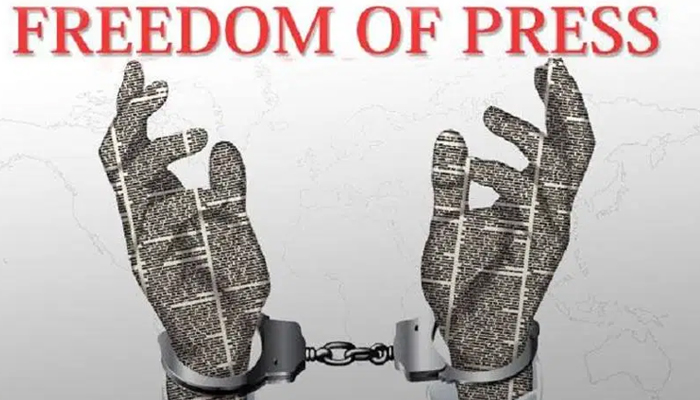Joint efforts for freedom of press stressed
LAHORE: Speakers at a national webinar on press freedom have called upon the need to create unity among journalist organisations to fight war against unnecessary restrictions on media observing that media freedom in Pakistan is associated with independence of democracy and judiciary.
Punjab University School of Communication Studies (SCS) organised the webinar which was attended by Pro Vice Chancellor Prof Dr Saleem Mazhar, SCS Director Prof Dr Noshina Saleem, senior most teachers of journalism including Prof Dr Mehdi Hasan, Prof Dr Shafiq Jullandhry, Dr Mujahid Ali Mansoori, eminent journalists Hamid Mir, Lahore Press Club President Arshad Ansari, Salman Ghani, faculty members and a large number of students.
According to a press release while addressing the webinar, Dr Mehdi Hasan said, “We could not achieve press freedom unless we ensured “right to know” and promoted investigative journalism.” He said that political parties and organisations of journalists should jointly work for the freedom of press in the country.
Dr Mujahid Mansoori said that Pakistani media enjoyed a limited freedom however people could not benefit even from that limited autonomy of the press to the extent they should. Hamid Mir said that Pakistani media had faced restrictions in the name of national interest and patriotism. He said that an independent press in Pakistan could lead to economic development of the country as well. He said that if the Journalists Protection Bill was not passed by the National Assembly in 2021, Pakistan might lose GSP Plus status and its 40 percent exports of textile industry to Europe might suffer.
He said that the elements who were delaying approval of the Journalists Protection Bill were actually weakening Pakistan. He said that press freedom was in the best interest of the state and democracy. He said the media freedom must be enjoyed with responsibility. He said that unnecessary restrictions on the internet might damage foreign investment in Pakistan. He said that the journalists and media organisations in India and Bangladesh were suffering from more threats and dangers than Pakistani journalists did face while performing their job. He said that attacks on journalists in Pakistan had increased 40 percent.
Salman Ghani said that when the politicians were in opposition, they supported media freedom however when they came to power, they changed their mindset regarding press freedom. He said that Pakistani media organisations were working under immense pressure. He said that Pakistani media must protect national interest, respect state institutions and highlight human rights and other issues. He said Pakistani journalists sacrificed their lives in the line of their duties.
Dr Saleem Mazhar said that Pakistani journalists played a key role for Pakistan to get important place in the Muslim world. Arshad Ansari said Pakistan was declared a dangerous place for journalists. He said journalism in Pakistan had been attacked many times since 1947. He said many restrictions had been imposed on journalists and their own social media channels were now also facing curbs.
Rana Azeem said that the journalists who speak, write and show truth faced bullets and restrictions. He said 4,113 journalists have lost their jobs during this government. He called upon PFUJ, PUJ, APNS, PBA, CPNE, press clubs and other journalist organisations to unite for the freedom of media in the country. Dr Noshina Saleem while thanking the participants said that an independent press could play an important role in socio-economic development of the country.
-
 Northern Lights: Calm Conditions Persist Amid Low Space Weather Activity
Northern Lights: Calm Conditions Persist Amid Low Space Weather Activity -
 'Look What Andrew Has Done': Meghan Markle Defended On Jeremy Vine Show
'Look What Andrew Has Done': Meghan Markle Defended On Jeremy Vine Show -
 Apple, Google Agree To Make 'app Store' Changes Over UK Regulator Concerns
Apple, Google Agree To Make 'app Store' Changes Over UK Regulator Concerns -
 Autodesk Files Lawsuit Against Google Over AI Video Tool Trademark Dispute
Autodesk Files Lawsuit Against Google Over AI Video Tool Trademark Dispute -
 San Francisco 49ers Player Shot Near Post-Super Bowl Party
San Francisco 49ers Player Shot Near Post-Super Bowl Party -
 Kardashian-Jenner Clan Brings Lewis Hamilton Into The Fold: Watch
Kardashian-Jenner Clan Brings Lewis Hamilton Into The Fold: Watch -
 Meghan Markle 'quietly Dreaded' As Ex-best Friend Receives Lucrative Offer For Bombshell Memoir About Duchess
Meghan Markle 'quietly Dreaded' As Ex-best Friend Receives Lucrative Offer For Bombshell Memoir About Duchess -
 Blake Shelton, Gwen Stefani Make Big Move To Save Their Marriage
Blake Shelton, Gwen Stefani Make Big Move To Save Their Marriage -
 Google Warns Of State-sponsored Cyberattacks Targeting Defense Sector Employees
Google Warns Of State-sponsored Cyberattacks Targeting Defense Sector Employees -
 Ransom Deadline Passes: FBI Confirms ‘communication Blackout’ In Nancy Guthrie Abduction
Ransom Deadline Passes: FBI Confirms ‘communication Blackout’ In Nancy Guthrie Abduction -
 Jeff Bezos Hints At Blue Origin Moon Plans As Elon Musk Responds With Cautious Praise
Jeff Bezos Hints At Blue Origin Moon Plans As Elon Musk Responds With Cautious Praise -
 Zach Bryan Slams Turning Point USA Alternative Halftime Show: 'Embarrassing As Hell'
Zach Bryan Slams Turning Point USA Alternative Halftime Show: 'Embarrassing As Hell' -
 South Korea Blames Coupang Data Breach On 'management Failures,' Not Cyber Attack
South Korea Blames Coupang Data Breach On 'management Failures,' Not Cyber Attack -
 ‘Disgraced’ Andrew More Concerned About ‘issue Of His Legacy’ Than Epstein Links
‘Disgraced’ Andrew More Concerned About ‘issue Of His Legacy’ Than Epstein Links -
 Instagram Plans New Snapchat-style App ‘Instants’ Amid Rising AR Competition
Instagram Plans New Snapchat-style App ‘Instants’ Amid Rising AR Competition -
 Safer Internet Day 2026: Is Social Media Ban The Only Way To Protect Kids?
Safer Internet Day 2026: Is Social Media Ban The Only Way To Protect Kids?




